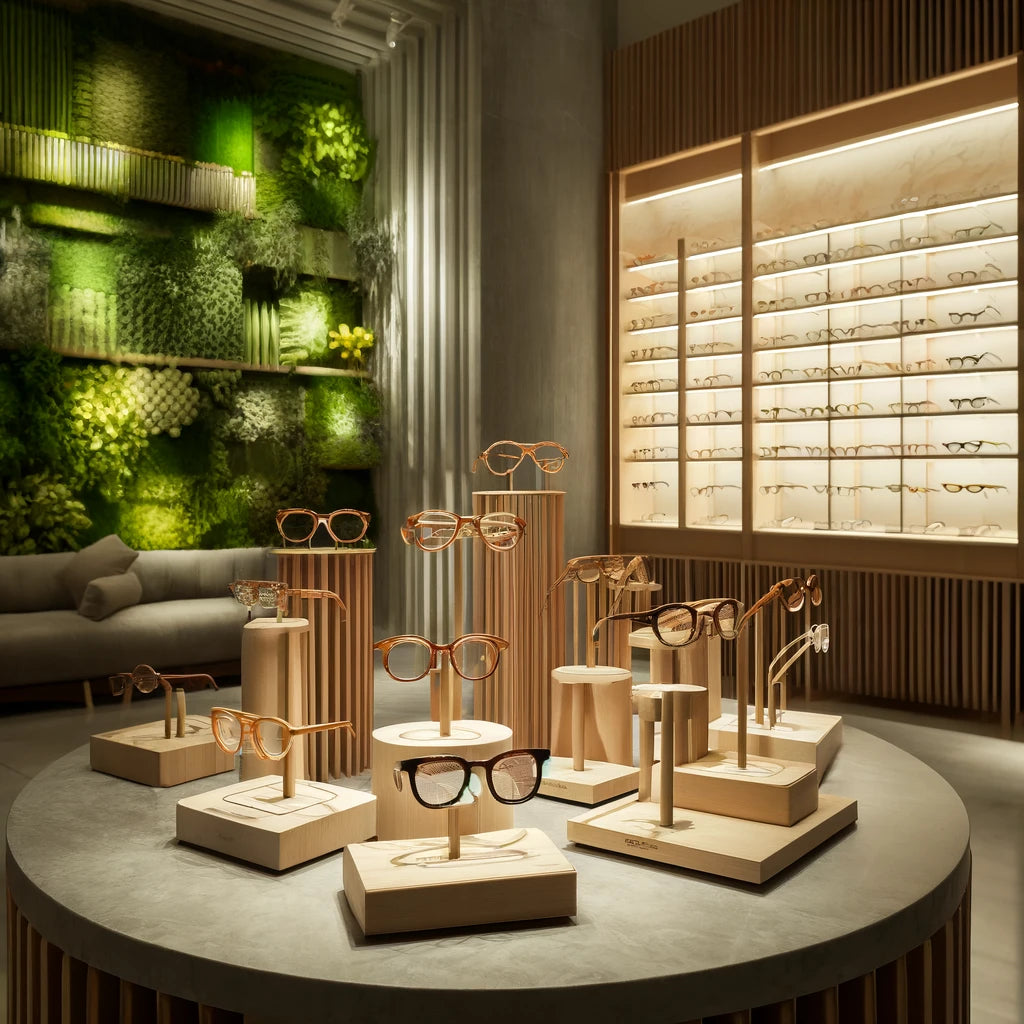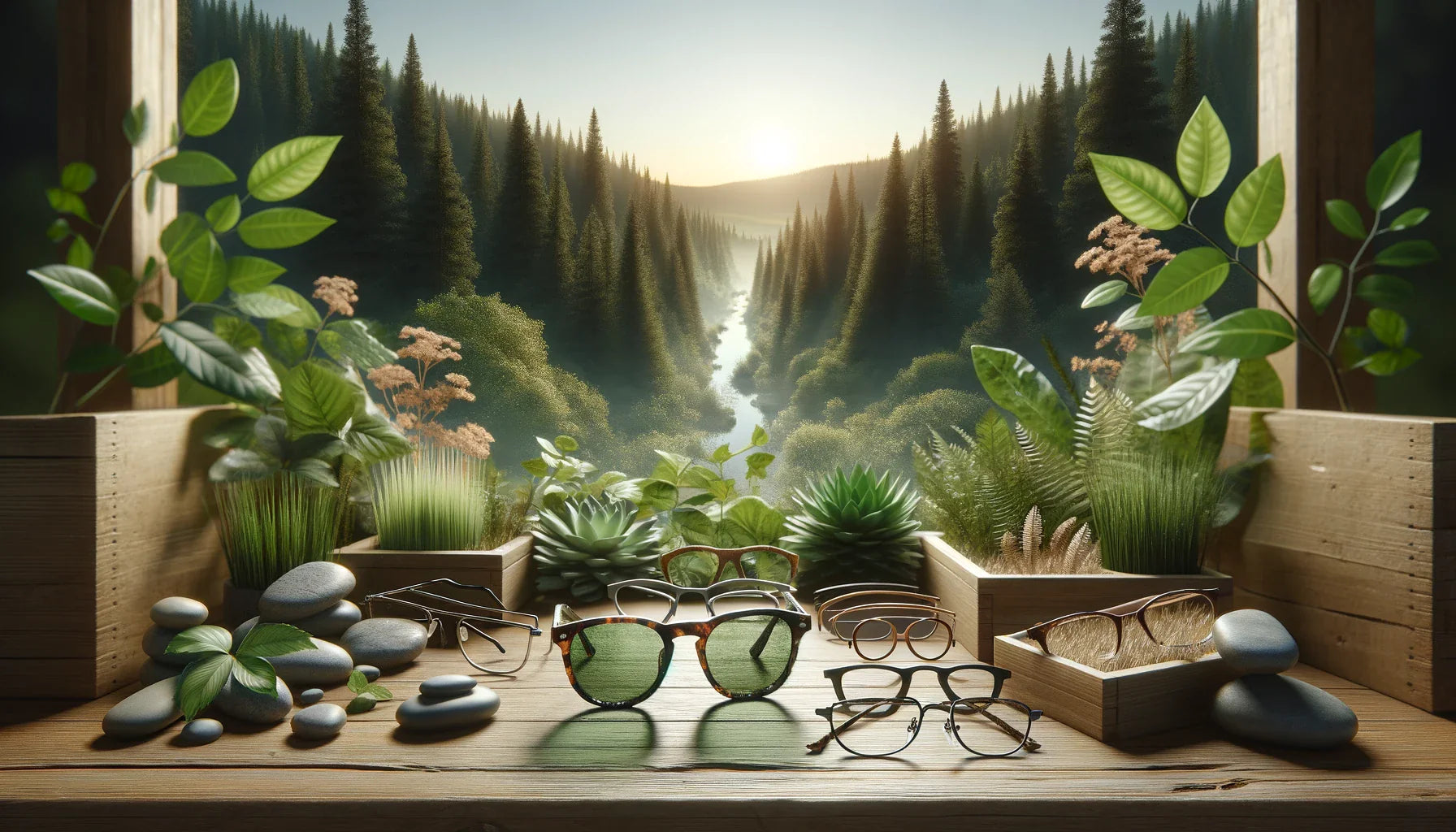Earth Day is a powerful reminder of our collective responsibility towards the planet. While crafting coveted shades and innovative lenses, the eyewear industry faces its share of environmental challenges. But here's the good news: sustainability is no longer a distant dream, but a tangible vision shaping the future of eyewear. Let's explore the environmental impact of eyewear and the innovative solutions transforming the industry.
The Environmental Impact: A Look Behind the Scenes
The stylish frames and innovative lenses we love come with an environmental footprint. Here's a closer look at the key concerns:
Resource Depletion: Manufacturing eyewear relies heavily on materials like metal, acetate, and glass. Extracting these materials requires significant resources, putting a strain on finite reserves.
Pollution: The production process often generates air and water pollution, impacting ecosystems and human health.
Waste Generation: Discarded plastic frames can take centuries to decompose in landfills, contributing to a growing waste crisis.
Just a single pair of plastic sunglasses can take up to 500 years to decompose in a landfill – a sobering statistic!

Sustainable Solutions: A Brighter Vision
The eyewear industry is actively embracing sustainability. Here are some exciting initiatives leading the charge:
Recycled Revolution: Leading brands are incorporating recycled materials into their collections. Luxottica, home to iconic labels like Ray-Ban and Oakley, according to their 2023 "Eyes on the Planet" report, increased the use of recycled materials in their production by a significant 17% in 2023 alone. This translates to a substantial reduction in their reliance on virgin resources. Safilo Group , another major player, boasts that 42% of their frames in 2022 were crafted from recycled materials (Safilo Group Sustainability Report 2022). This demonstrates a clear commitment to a more circular economy within the eyewear industry.
Biodegradable Bonanza: Innovation is taking center stage. Kering Eyewear, which houses luxury brands like Gucci and Saint Laurent, is pioneering the use of bio-based plastic made from castor beans. This material not only reduces reliance on fossil fuels but also ensures faster biodegradation at the end of the product's life cycle (Kering Eyewear 2021 Sustainability Report). This innovation has the potential to revolutionize the end-of-life cycle management of eyewear, significantly reducing landfill waste.
Natural Materials Movement: High-end brands like Tom Ford and Prada are exploring natural and sustainable materials like cellulose acetate, derived from renewable wood pulp, for their luxury eyewear collections. Cellulose acetate offers a biodegradable alternative to traditional plastics, albeit with considerations for responsible forestry practices.

Energy Efficiency Efforts: Reducing energy consumption is key. Kering Eyewear achieved a commendable 6% reduction in energy consumption in 2021 through investments in energy-efficient technology. This seemingly small percentage translates to a significant reduction in their environmental footprint.
Waste Reduction Strategies: Minimizing waste generation is crucial. Safilo Group has set an ambitious target of achieving zero waste to landfill by 2025, showcasing a commitment to responsible production practices. This target pushes the boundaries of what's possible and sets a high bar for the entire industry. Marcolin has put in place a strategic plan that encompasses a focus on the environment, people and corporate governance, aiming to achieve the 17 World Sustainable Development Goals set by the United Nations in 2015.
Challenges and the Road Ahead
While these initiatives are promising, there are hurdles to overcome:
Cost Factor: Sustainable materials and processes often come with a higher price tag, making them less accessible for some brands. This creates a challenge in balancing environmental responsibility with affordability for consumers.
Consumer Preferences: Shifting consumer behavior towards sustainable options requires ongoing education and awareness campaigns. LookerOnline can play a vital role here by highlighting the sustainable aspects of the eyewear brands they offer.
Industry-Wide Collaboration: Collective efforts across the entire supply chain are necessary to accelerate progress towards true sustainability. Collaboration between raw material suppliers, manufacturers, brands, and retailers is essential to ensure sustainable practices are implemented throughout the eyewear lifecycle.

LookerOnline: Championing Sustainable Eyewear
At LookerOnline, we understand the importance of environmental responsibility. That's why we carefully curate our collections, partnering with brands from leading manufacturers like Kering Eyewear, Luxottica, Safilo Group, and Marcolin who are demonstrably committed to sustainability efforts. We believe in transparency, and many of these brands publish detailed sustainability reports outlining their goals and progress.
Beyond brand selection, we’ve been taking concrete steps to minimize our environmental impact. We've partnered with DHL Go Green to offer eco-friendly shipping options, and all our packages are 100% plastic-free.
Together, with the industry's collective efforts and informed consumer choices, we can ensure that the future of eyewear is not just stylish, but sustainable as well. Let's make every day Earth Day for the eyewear industry!
So, Can It Be Done?
The answer is a resounding yes. The eyewear industry is demonstrably taking significant strides towards greater environmental responsibility. From pioneering the use of recycled materials and bio-based plastics to exploring natural alternatives and implementing energy-efficient practices, leading manufacturers are paving the way for a more sustainable future. While challenges remain – particularly regarding cost and consumer behavior – the industry's collective efforts offer a promising outlook.
Ultimately, a truly sustainable future for the eyewear industry requires a collective effort. Manufacturers, brands, retailers, and consumers all have a role to play. By educating ourselves, making informed choices, and supporting brands committed to sustainability, we can ensure that every day is Earth Day for the eyewear industry. Let's look towards a future where style and sustainability go hand-in-hand, ensuring a brighter vision not just for ourselves, but for the planet as well.





